Report on Information Exchange and Coordination in Healthcare
VerifiedAdded on 2022/08/08
|5
|1215
|18
Report
AI Summary
This report examines the critical role of information exchange and coordination in healthcare, emphasizing the need for accuracy, professionalism, and prioritization. It explores how prioritizing health information helps in resource allocation and effective care delivery, addressing challenges like limited resources and the importance of transparent decision-making processes. The report highlights the significance of effective coordination in healthcare, identifying it as an essential element that enhances healthcare quality, reduces errors, and streamlines administrative tasks. It also discusses the impact of health information exchange on patient involvement and the growing patient-centric approach in healthcare, while also emphasizing the importance of horizontal and vertical coordination. The report concludes by summarizing the importance of establishing a coordinated system to handle constant information exchange and improve healthcare outcomes, suggesting that following proper steps to prioritize significance and establishing a well-coordinated system can improve healthcare.
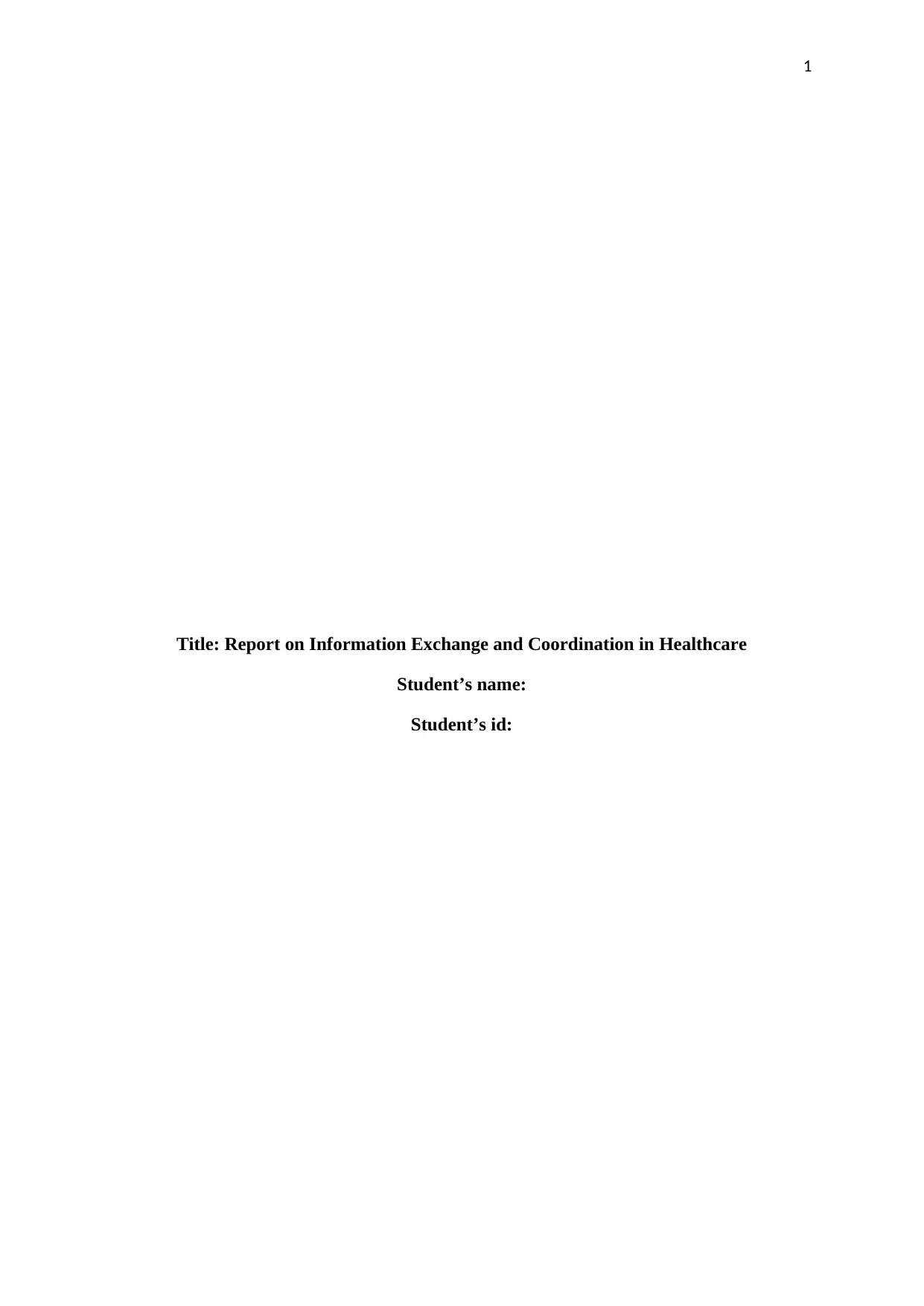
1
Title: Report on Information Exchange and Coordination in Healthcare
Student’s name:
Student’s id:
Title: Report on Information Exchange and Coordination in Healthcare
Student’s name:
Student’s id:
Paraphrase This Document
Need a fresh take? Get an instant paraphrase of this document with our AI Paraphraser
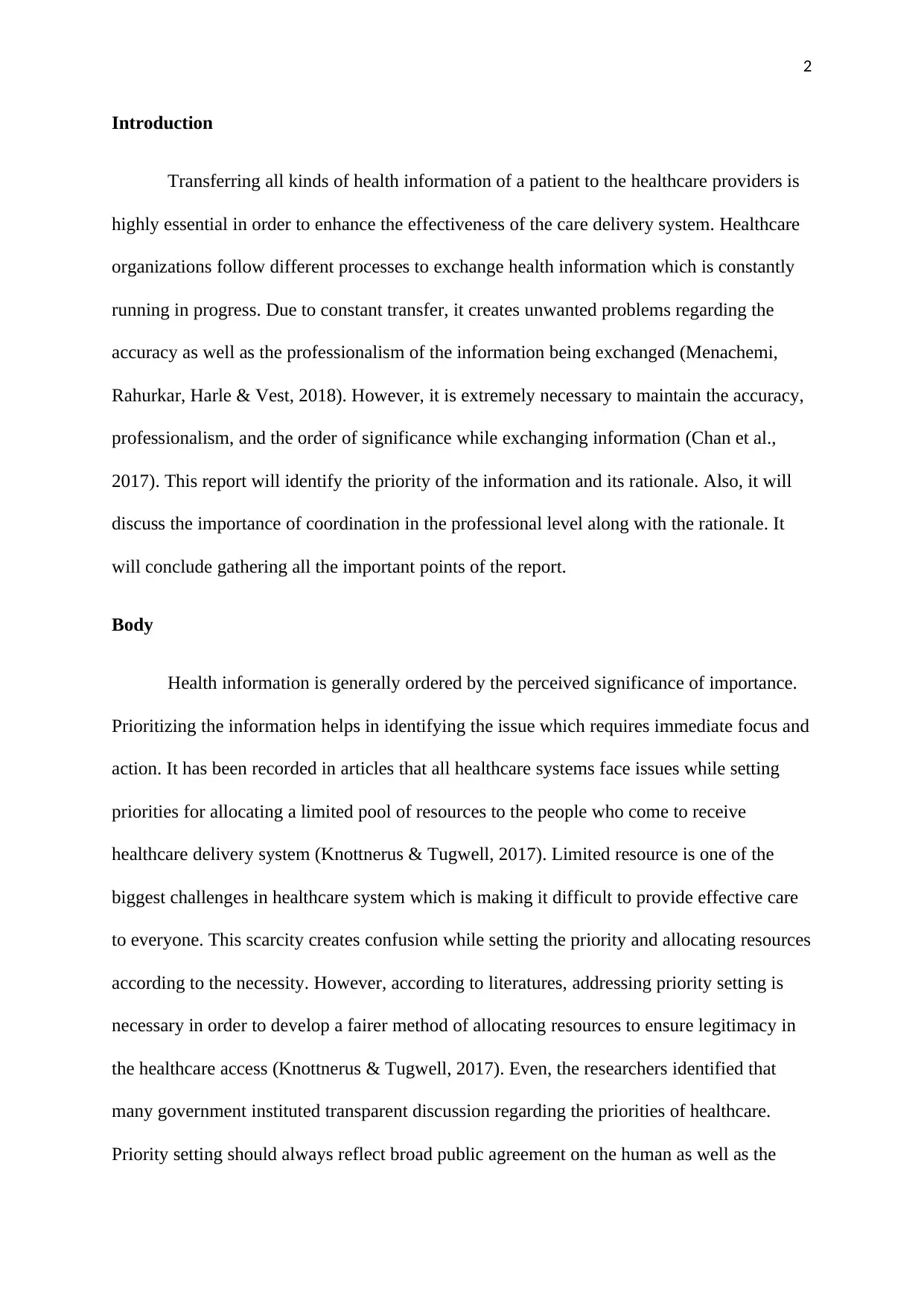
2
Introduction
Transferring all kinds of health information of a patient to the healthcare providers is
highly essential in order to enhance the effectiveness of the care delivery system. Healthcare
organizations follow different processes to exchange health information which is constantly
running in progress. Due to constant transfer, it creates unwanted problems regarding the
accuracy as well as the professionalism of the information being exchanged (Menachemi,
Rahurkar, Harle & Vest, 2018). However, it is extremely necessary to maintain the accuracy,
professionalism, and the order of significance while exchanging information (Chan et al.,
2017). This report will identify the priority of the information and its rationale. Also, it will
discuss the importance of coordination in the professional level along with the rationale. It
will conclude gathering all the important points of the report.
Body
Health information is generally ordered by the perceived significance of importance.
Prioritizing the information helps in identifying the issue which requires immediate focus and
action. It has been recorded in articles that all healthcare systems face issues while setting
priorities for allocating a limited pool of resources to the people who come to receive
healthcare delivery system (Knottnerus & Tugwell, 2017). Limited resource is one of the
biggest challenges in healthcare system which is making it difficult to provide effective care
to everyone. This scarcity creates confusion while setting the priority and allocating resources
according to the necessity. However, according to literatures, addressing priority setting is
necessary in order to develop a fairer method of allocating resources to ensure legitimacy in
the healthcare access (Knottnerus & Tugwell, 2017). Even, the researchers identified that
many government instituted transparent discussion regarding the priorities of healthcare.
Priority setting should always reflect broad public agreement on the human as well as the
Introduction
Transferring all kinds of health information of a patient to the healthcare providers is
highly essential in order to enhance the effectiveness of the care delivery system. Healthcare
organizations follow different processes to exchange health information which is constantly
running in progress. Due to constant transfer, it creates unwanted problems regarding the
accuracy as well as the professionalism of the information being exchanged (Menachemi,
Rahurkar, Harle & Vest, 2018). However, it is extremely necessary to maintain the accuracy,
professionalism, and the order of significance while exchanging information (Chan et al.,
2017). This report will identify the priority of the information and its rationale. Also, it will
discuss the importance of coordination in the professional level along with the rationale. It
will conclude gathering all the important points of the report.
Body
Health information is generally ordered by the perceived significance of importance.
Prioritizing the information helps in identifying the issue which requires immediate focus and
action. It has been recorded in articles that all healthcare systems face issues while setting
priorities for allocating a limited pool of resources to the people who come to receive
healthcare delivery system (Knottnerus & Tugwell, 2017). Limited resource is one of the
biggest challenges in healthcare system which is making it difficult to provide effective care
to everyone. This scarcity creates confusion while setting the priority and allocating resources
according to the necessity. However, according to literatures, addressing priority setting is
necessary in order to develop a fairer method of allocating resources to ensure legitimacy in
the healthcare access (Knottnerus & Tugwell, 2017). Even, the researchers identified that
many government instituted transparent discussion regarding the priorities of healthcare.
Priority setting should always reflect broad public agreement on the human as well as the
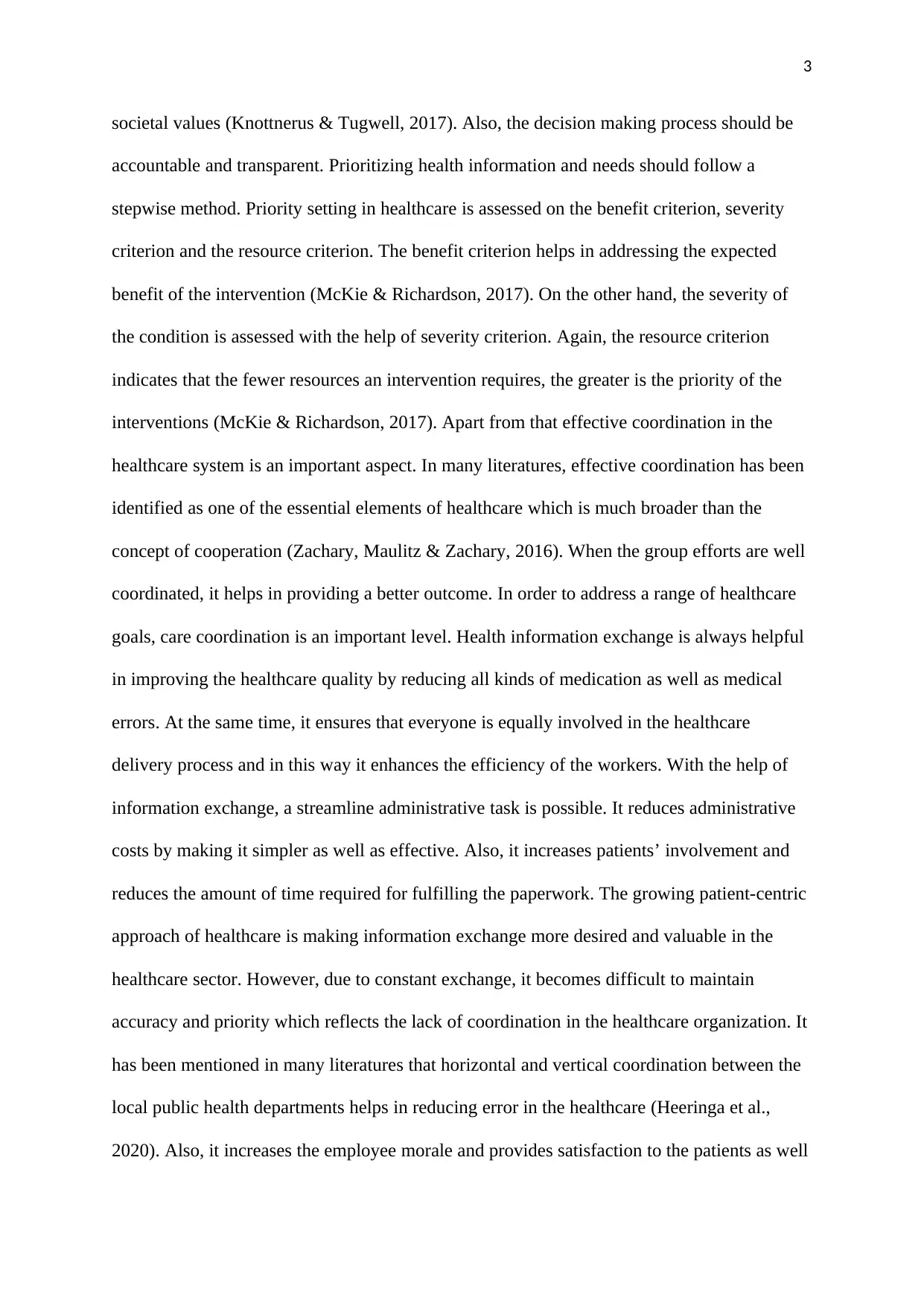
3
societal values (Knottnerus & Tugwell, 2017). Also, the decision making process should be
accountable and transparent. Prioritizing health information and needs should follow a
stepwise method. Priority setting in healthcare is assessed on the benefit criterion, severity
criterion and the resource criterion. The benefit criterion helps in addressing the expected
benefit of the intervention (McKie & Richardson, 2017). On the other hand, the severity of
the condition is assessed with the help of severity criterion. Again, the resource criterion
indicates that the fewer resources an intervention requires, the greater is the priority of the
interventions (McKie & Richardson, 2017). Apart from that effective coordination in the
healthcare system is an important aspect. In many literatures, effective coordination has been
identified as one of the essential elements of healthcare which is much broader than the
concept of cooperation (Zachary, Maulitz & Zachary, 2016). When the group efforts are well
coordinated, it helps in providing a better outcome. In order to address a range of healthcare
goals, care coordination is an important level. Health information exchange is always helpful
in improving the healthcare quality by reducing all kinds of medication as well as medical
errors. At the same time, it ensures that everyone is equally involved in the healthcare
delivery process and in this way it enhances the efficiency of the workers. With the help of
information exchange, a streamline administrative task is possible. It reduces administrative
costs by making it simpler as well as effective. Also, it increases patients’ involvement and
reduces the amount of time required for fulfilling the paperwork. The growing patient-centric
approach of healthcare is making information exchange more desired and valuable in the
healthcare sector. However, due to constant exchange, it becomes difficult to maintain
accuracy and priority which reflects the lack of coordination in the healthcare organization. It
has been mentioned in many literatures that horizontal and vertical coordination between the
local public health departments helps in reducing error in the healthcare (Heeringa et al.,
2020). Also, it increases the employee morale and provides satisfaction to the patients as well
societal values (Knottnerus & Tugwell, 2017). Also, the decision making process should be
accountable and transparent. Prioritizing health information and needs should follow a
stepwise method. Priority setting in healthcare is assessed on the benefit criterion, severity
criterion and the resource criterion. The benefit criterion helps in addressing the expected
benefit of the intervention (McKie & Richardson, 2017). On the other hand, the severity of
the condition is assessed with the help of severity criterion. Again, the resource criterion
indicates that the fewer resources an intervention requires, the greater is the priority of the
interventions (McKie & Richardson, 2017). Apart from that effective coordination in the
healthcare system is an important aspect. In many literatures, effective coordination has been
identified as one of the essential elements of healthcare which is much broader than the
concept of cooperation (Zachary, Maulitz & Zachary, 2016). When the group efforts are well
coordinated, it helps in providing a better outcome. In order to address a range of healthcare
goals, care coordination is an important level. Health information exchange is always helpful
in improving the healthcare quality by reducing all kinds of medication as well as medical
errors. At the same time, it ensures that everyone is equally involved in the healthcare
delivery process and in this way it enhances the efficiency of the workers. With the help of
information exchange, a streamline administrative task is possible. It reduces administrative
costs by making it simpler as well as effective. Also, it increases patients’ involvement and
reduces the amount of time required for fulfilling the paperwork. The growing patient-centric
approach of healthcare is making information exchange more desired and valuable in the
healthcare sector. However, due to constant exchange, it becomes difficult to maintain
accuracy and priority which reflects the lack of coordination in the healthcare organization. It
has been mentioned in many literatures that horizontal and vertical coordination between the
local public health departments helps in reducing error in the healthcare (Heeringa et al.,
2020). Also, it increases the employee morale and provides satisfaction to the patients as well
⊘ This is a preview!⊘
Do you want full access?
Subscribe today to unlock all pages.

Trusted by 1+ million students worldwide
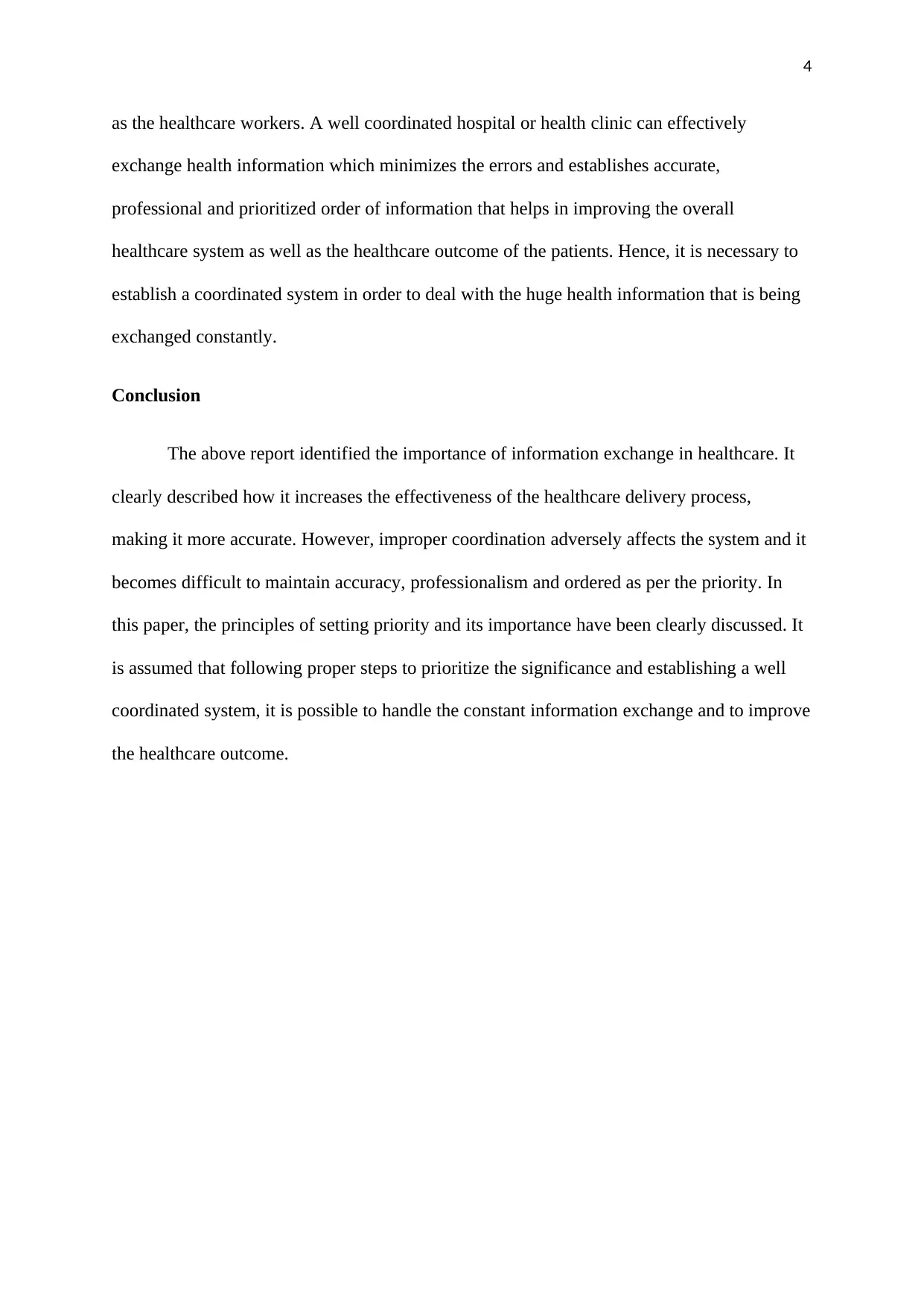
4
as the healthcare workers. A well coordinated hospital or health clinic can effectively
exchange health information which minimizes the errors and establishes accurate,
professional and prioritized order of information that helps in improving the overall
healthcare system as well as the healthcare outcome of the patients. Hence, it is necessary to
establish a coordinated system in order to deal with the huge health information that is being
exchanged constantly.
Conclusion
The above report identified the importance of information exchange in healthcare. It
clearly described how it increases the effectiveness of the healthcare delivery process,
making it more accurate. However, improper coordination adversely affects the system and it
becomes difficult to maintain accuracy, professionalism and ordered as per the priority. In
this paper, the principles of setting priority and its importance have been clearly discussed. It
is assumed that following proper steps to prioritize the significance and establishing a well
coordinated system, it is possible to handle the constant information exchange and to improve
the healthcare outcome.
as the healthcare workers. A well coordinated hospital or health clinic can effectively
exchange health information which minimizes the errors and establishes accurate,
professional and prioritized order of information that helps in improving the overall
healthcare system as well as the healthcare outcome of the patients. Hence, it is necessary to
establish a coordinated system in order to deal with the huge health information that is being
exchanged constantly.
Conclusion
The above report identified the importance of information exchange in healthcare. It
clearly described how it increases the effectiveness of the healthcare delivery process,
making it more accurate. However, improper coordination adversely affects the system and it
becomes difficult to maintain accuracy, professionalism and ordered as per the priority. In
this paper, the principles of setting priority and its importance have been clearly discussed. It
is assumed that following proper steps to prioritize the significance and establishing a well
coordinated system, it is possible to handle the constant information exchange and to improve
the healthcare outcome.
Paraphrase This Document
Need a fresh take? Get an instant paraphrase of this document with our AI Paraphraser
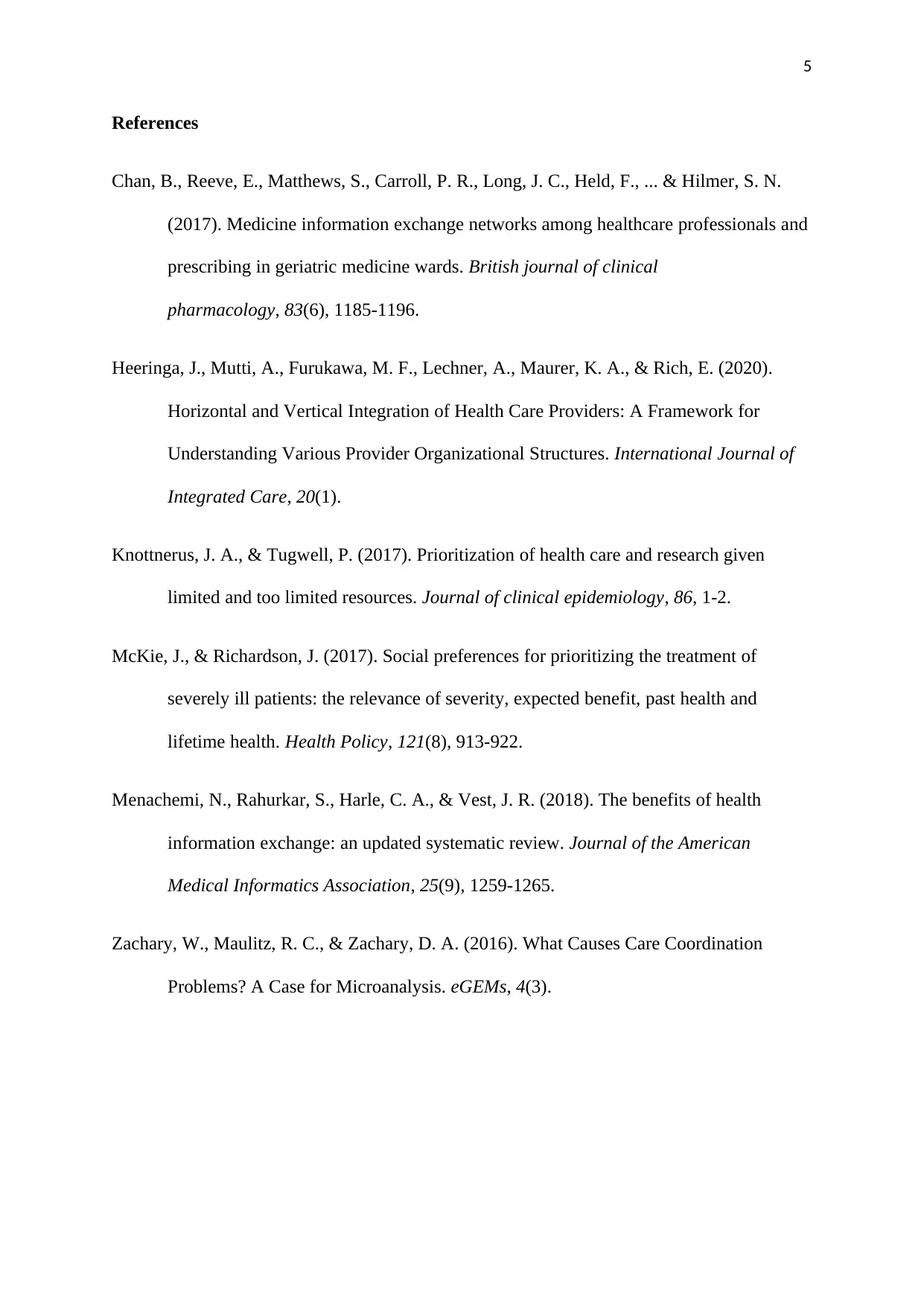
5
References
Chan, B., Reeve, E., Matthews, S., Carroll, P. R., Long, J. C., Held, F., ... & Hilmer, S. N.
(2017). Medicine information exchange networks among healthcare professionals and
prescribing in geriatric medicine wards. British journal of clinical
pharmacology, 83(6), 1185-1196.
Heeringa, J., Mutti, A., Furukawa, M. F., Lechner, A., Maurer, K. A., & Rich, E. (2020).
Horizontal and Vertical Integration of Health Care Providers: A Framework for
Understanding Various Provider Organizational Structures. International Journal of
Integrated Care, 20(1).
Knottnerus, J. A., & Tugwell, P. (2017). Prioritization of health care and research given
limited and too limited resources. Journal of clinical epidemiology, 86, 1-2.
McKie, J., & Richardson, J. (2017). Social preferences for prioritizing the treatment of
severely ill patients: the relevance of severity, expected benefit, past health and
lifetime health. Health Policy, 121(8), 913-922.
Menachemi, N., Rahurkar, S., Harle, C. A., & Vest, J. R. (2018). The benefits of health
information exchange: an updated systematic review. Journal of the American
Medical Informatics Association, 25(9), 1259-1265.
Zachary, W., Maulitz, R. C., & Zachary, D. A. (2016). What Causes Care Coordination
Problems? A Case for Microanalysis. eGEMs, 4(3).
References
Chan, B., Reeve, E., Matthews, S., Carroll, P. R., Long, J. C., Held, F., ... & Hilmer, S. N.
(2017). Medicine information exchange networks among healthcare professionals and
prescribing in geriatric medicine wards. British journal of clinical
pharmacology, 83(6), 1185-1196.
Heeringa, J., Mutti, A., Furukawa, M. F., Lechner, A., Maurer, K. A., & Rich, E. (2020).
Horizontal and Vertical Integration of Health Care Providers: A Framework for
Understanding Various Provider Organizational Structures. International Journal of
Integrated Care, 20(1).
Knottnerus, J. A., & Tugwell, P. (2017). Prioritization of health care and research given
limited and too limited resources. Journal of clinical epidemiology, 86, 1-2.
McKie, J., & Richardson, J. (2017). Social preferences for prioritizing the treatment of
severely ill patients: the relevance of severity, expected benefit, past health and
lifetime health. Health Policy, 121(8), 913-922.
Menachemi, N., Rahurkar, S., Harle, C. A., & Vest, J. R. (2018). The benefits of health
information exchange: an updated systematic review. Journal of the American
Medical Informatics Association, 25(9), 1259-1265.
Zachary, W., Maulitz, R. C., & Zachary, D. A. (2016). What Causes Care Coordination
Problems? A Case for Microanalysis. eGEMs, 4(3).
1 out of 5
Related Documents
Your All-in-One AI-Powered Toolkit for Academic Success.
+13062052269
info@desklib.com
Available 24*7 on WhatsApp / Email
![[object Object]](/_next/static/media/star-bottom.7253800d.svg)
Unlock your academic potential
Copyright © 2020–2026 A2Z Services. All Rights Reserved. Developed and managed by ZUCOL.





